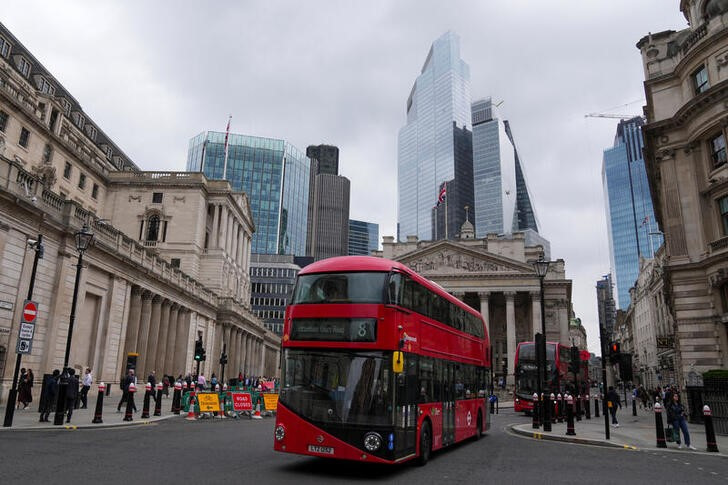By Andy Bruce
(Reuters) - Britain's shift towards a services-dominated economy is accelerating, pushing manufacturing's share of economic output to a historic low and setting the nation apart from its global peers.
Recent data show the make-up of the world's sixth-biggest economy is changing fast, driven by global trends but also domestic factors such as Brexit and increasingly London-centric growth.
Britain now exports more in services - which include finance, accountancy, legal advice, management consultancy and advertising - than it does goods, a first among the Group of Seven large advanced economies. What's more, the gap is widening fast.
Meanwhile, manufacturing's share of British economic output sank to a record low of 9.2% during the second quarter of this year, according to official data, compared with 9.9% before the COVID-19 pandemic, according to Reuters calculations based on national accounts data.
Although factory output itself is almost a fifth higher than its level of the mid-2000s, that expansion has halted in recent years.
Instead, the services sector has driven Britain's sluggish economic growth in recent years.
It now accounts for 81.2% of British economic output, up from less than 80% before the pandemic.
The Office for National Statistics has not updated its estimates of each industry's share of the economy since the pandemic wrought havoc with the national accounts, but an update is scheduled at the end of the month.
The update on Sept. 30 looks certain to confirm the drop in manufacturing's share of the economy.
Trade body Make UK said this could represent an image problem for British industry, even though British manufacturers will remain an important part of global supply chains, as well as a major source of employment and destination for international investment.
"Where it does concern us ... is more about how manufacturing is perceived in the UK, to the rest of the world," said Fhaheen Khan, senior economist at manufacturing association Make UK.
Manufacturing as a proportion of the economy has declined faster in Britain since the mid-1990s than in any other major European economy.
Khan said it was vital that Prime Minister Keir Starmer's new Labour government implemented a coherent and long-term industrial strategy, which Britain has lacked in recent decades, despite various attempts, all of which have proved short-lived.
Manufacturers will be eyeing the Oct. 30 budget for more details.
The ascendancy of the services sector helps to explain the worsening regional divide between the services powerhouse London, and the manufacturing-heavy parts of the country like the midlands and north of England - gaps which Starmer has pledged to tackle.
London's share of the national economy has surged by over 3 percentage points since 2000 to 24%, with no other British region increasing its share over the same period.
TRADE TRANSFORMED
The shift towards services has been especially marked in trade data.
Britain has exported more services than goods for six quarters in a row - something that has never happened before in trade data that dates back to the 1950s.
Britain exported a record 99.3 billion pounds ($129.6 billion) of services during the second quarter. But it exported only 76.9 billion pounds of goods - similar to levels seen during the late 2000s when adjusted for inflation.
"Global demand for services is driving a lot of it but the UK has been increasing its market share as well," said Sophie Hale, principal economist at the Resolution Foundation think tank.
Professional services like accountancy, outsourcing and law firms have driven the upswing, rather than financial service exports which have fallen in real-terms to levels seen around 20 years ago - possibly as a consequence of Brexit.
Although Britain does not face tariffs when selling goods to the EU, business groups and survey evidence suggest goods exporters have still found trade harder because of customs delays, more form-filling and other non-tariff barriers.
"Most estimates suggest that this suppressed UK trade, which is especially important for manufacturing," said Rob Wood, chief UK economist at consultancy Pantheon Macroeconomics.
He said he expected the services sector to become even more dominant in Britain's economy.

"Governments can take decisions that would change the industrial mix - you can change education, you can change infrastructure, you can create incentives for investment," Wood said. "But there aren't any on the horizon, so (the shift) is likely to continue."
($1 = 0.7662 pounds)
(Graphics by Sumanta Sen and Andy Bruce; Editing by Christina Fincher)
